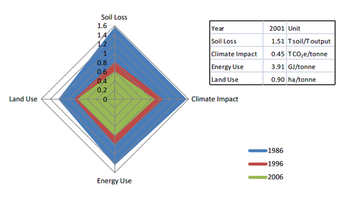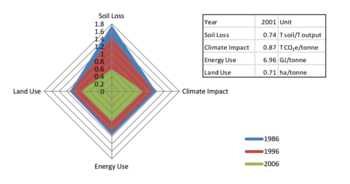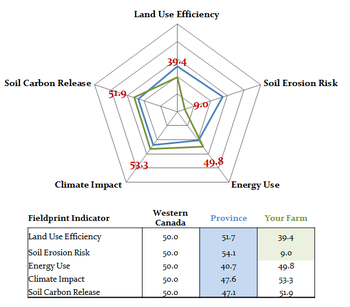Canadian Field Print Initiative
 Lentils Sustainability Indicators over Time
Lentils Sustainability Indicators over Time
The Field Print Initiative first developed sustainability metrics for Western Canadian crop production in 2011. These metrics follow the basic design of the Field to Market metrics developed for the United States, in response to demand for sustainability information from consumers and food companies. Metrics were developed for Land Use, Soil Loss, Energy Use and Climate Impact, across the crop-producing area of Western Canada. These macro-level metrics were developed for wheat (spring, winter, durum), canola, oats, peas, flax and lentils.
In 2013, this led to the development and pilot of the Canadian Field Print Calculator. This tool is designed to be used at the level of the individual farm, to enable producers to:
- Compare the sustainability outcomes on their farms to regional averages
- Compare their sustainability outcomes over time
- Compare the sustainability outcomes of alternative scenarios on their farms
The Field Print Initiative has broad representation from Canada’s crop production organizations, and is working closely with the Canadian Roundtable for Sustainable Crops. It continues to follow the approach of Field to Market in the US, whose membership includes Cargill, Bunge, General Mills, Kellogg, McDonald’s Corp, Coca-Cola, Unilever and Walmart.
Grain companies and food companies are starting to demand information relating to sustainable practices:
- General Mills has committed to “sustainably source 100% of its 10 priority ingredients by 2020”, including wheat, oats, corn, dairy (General Mills News Release, September 2013)
- Unilever intends to source 100% of its agricultural raw materials sustainably by 2020
- Walmart is sending out questionnaires to suppliers, asking for more information on sustainability performance and sourcing of commodities
Why This Pilot Project Matters to Producers
 Canola Efficiency Indicators over Time
Canola Efficiency Indicators over Time
The good news is that the production of crops has become increasingly sustainable over the past decades. For example, the sustainability of canola production became increasingly sustainable on all four indicators in the 2011 study (See the full version of that report). Through the Field Print Initiative, Canadian agriculture will be able to demonstrate and motivate continued improvement on sustainability measures.
The reality is that farmers may someday also be required to document their practices for metrics relating to objectively determined sustainability indicators. By participating in this Pilot Project, you will be an early adopter of these metrics while also helping to develop the tool and benchmarks. Your feedback on the calculator itself is most appreciated, as will be the contribution of your data towards building regional benchmark values.
The calculator provides some immediate feedback in the form of spidergrams like those shown on this webpage (click on them to expand to full size). Essentially, these charts visually depict the estimated impact on a certain indicator. Points toward the centre of the spidergram depict lower impact, while points at the outside shower higher impact. In the case of the canola impact to the right, for example, one can see that the impact on all four indicators has decreased over the period 1986 to 2006. Sustainability has improved on all four areas -- soil loss, land use, energy use, and climate impact. The biggest improvement in sustainability was on the potential soil loss, due largely to the significant reduction of tillage and increasing yields in canola production across western Canada over those years.
Who is Coordinating the Pilot Project?
 Sample Output Spidergram
Sample Output Spidergram
Agri-Trend, Farmers Edge, and Agri-Data Solutions are helping Serecon collect the data for the calculator pilot. The data you provide will be aggregated without your personal identification. Your providing us with data is entirely voluntary, but would be very much appreciated.
Staff from any of these organizations may be approaching you to ask for your participation. If you have heard about the pilot project from others, please do reach out to contact either Angela Pearson or Markus Weber at 780-448-7440 to tell us of your interest.
In the end, by measuring your sustainability and contributing your field data to the Canadian database, you can help to drive continued progress on the sustainability of Canadian crop production. And there is benefit to your farm as well -- by comparing different scenarios/farms/years, you can get a picture of your management practices' impact on sustainability -- and your bottom line.
Want to give it a try? Get more details on the calculator.


